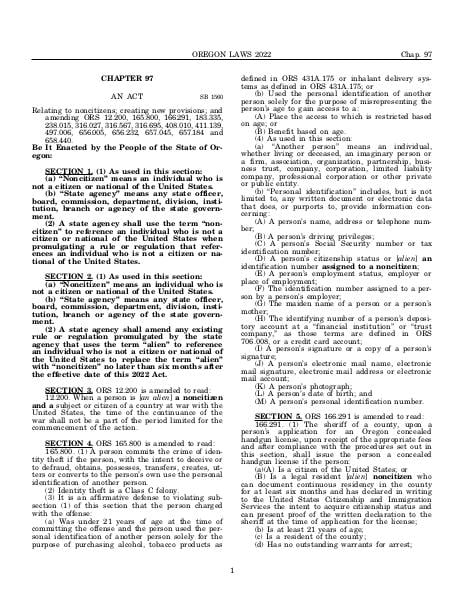Notice
- content
- public comment
- temporary rule adoption, amendment or suspension
- substantial compliance required
Source:
Section 183.335 — Notice; content; public comment; temporary rule adoption, amendment or suspension; substantial compliance required, https://www.oregonlegislature.gov/bills_laws/ors/ors183.html.
Notes of Decisions
The adopted rules need not be identical to the proposed rules to satisfy the notice requirements of this section. Bassett v. State Fish and Wildlife Comm., 27 Or App 639, 556 P2d 1382 (1976)
Where Children’s Services Division adopted two temporary rules terminating child care payment program but never adopted permanent rule to that effect, plaintiffs-former recipients were entitled to declaratory judgment that CSD’s termination of program was ineffective because of failure to properly adopt rule. Burke v. Children’s Services Division, 288 Or 533, 607 P2d 141 (1980)
Under this section, temporary emergency rules may be adopted only if agency finds failure to act promptly will result in serious prejudice to public interest or interest of parties; without such showing, temporary rules are invalid. Metro. Hospitals v. State Health Planning, 52 Or App 621, 628 P2d 783 (1981)
Where petitioner challenges Water Resources Commission’s temporary rule amending OAR 690-80-060 (5)(c), commission’s findings and statement of need do not provide adequate support for promulgation of temporary rule and rule was therefore, adopted without compliance with applicable rulemaking procedures and violates Scenic Waterways Act. Waterwatch of Oregon v. Oregon Water Res. Comm., 97 Or App 1, 774 P2d 1118 (1989)
Rule adopted by Department of Insurance and Finance is invalid where notice of proposed rulemaking did not contain adequate fiscal impact statement containing estimate of economic impact caused if rule adopted. Dika v. Department of Insurance and Finance, 312 Or 106, 817 P2d 287 (1991)
Purpose of this section, to provide protection against arbitrary and inadequately informed governmental conduct, has been met where notice informs license holders of potential financial impact, extent of which is unknown. Troutlodge, Inc. v. Dept. of Fish and Wildlife, 113 Or App 123, 830 P2d 622 (1992), Sup Ct review denied
Error on statement of need does not render rulemaking invalid if statement serves purpose of giving notice to potentially affected parties. Assn. of Oregon Loggers v. Dept. of Insurance and Finance, 130 Or App 594, 883 P2d 859 (1994), Sup Ct review denied
Agency consideration of summary prepared by hearing officer who reviewed all submitted material complies with requirement of full consideration by agency of submitted material. Don’t Waste Oregon Committee v. Energy Facility Siting Council, 320 Or 132, 881 P2d 119 (1994)
To challenge rule on procedural grounds, petitioners need not show that they were prejudiced by board’s alleged failure to include adequate statement of financial impact in notice of rulemaking. Oregon Funeral Directors v. Mortuary and Cemetery Bd., 132 Or App 318, 888 P2d 104 (1995)
Fiscal impact statement is sufficient if statement informs public and businesses of economic impact of proposed rule with sufficient detail to allow public and businesses to determine likely fiscal impact on them. Oregon Funeral Directors v. Mortuary and Cemetery Bd., 132 Or App 318, 888 P2d 104 (1995)
Statement of need is intended to identify need perceived by agency, whether or not perception is factually correct. Fremont Lumber Co. v. Energy Facility Siting Council, 325 Or 256, 936 P2d 968 (1997)
Adequacy of fiscal impact statement must be assessed in terms of actual impact, not impact perceived by agency. Fremont Lumber Co. v. Energy Facility Siting Council, 325 Or 256, 936 P2d 968 (1997)
Fiscal impact statement stating that economic impact is unknown, without explanation why impact is unknown, is inadequate. The Building Department, LLC v. Department of Consumer and Business Services, 180 Or App 486, 43 P3d 1167 (2002)
Statement of fiscal impact must identify entities affected by adoption of rule and must give affected entities enough information to evaluate position and participate in adoption process or explain why information is unavailable. Independent Contractors Research Institute v. Department of Administrative Services, 207 Or App 78, 139 P3d 995 (2006), Sup Ct review denied
For purposes of judicial review under ORS 183.400 to determine whether agency rule was adopted in compliance with applicable rulemaking procedures, agency satisfies section’s procedural requirements by substantially complying with procedures set out in section. Friends of the Columbia Gorge v. Energy Facility Siting Council, 365 Or 371, 446 P3d 53 (2019)
Court reviews substance of agency finding of serious prejudice justifying rulemaking without notice or hearing, and legal uncertainty alone is insufficient for finding of serious prejudice. Friends of Columbia Gorge v. Energy Facility Siting Counsel, 366 Or 78, 456 P3d 635 (2020)
Attorney General Opinions
Application of filing requirements and statement requirements to rule-making proceedings substantially completed before effective date, (1978) Vol 38, p 1939
